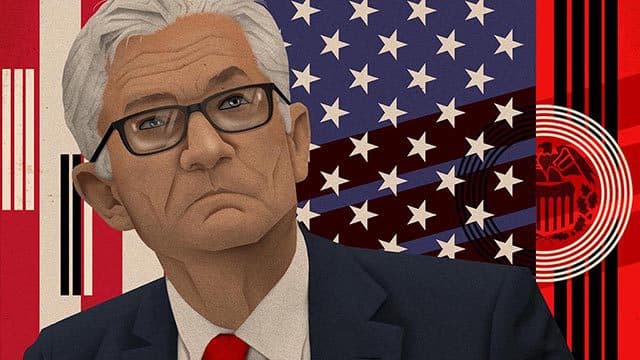Fed Chair Powell: Economy Depends on Covid Path
FOMC still seeking to achieve maximum employment and 2% inflation rate over the longer run.

Jerome Powell, chair, Federal Reserve, Blockworks Exclusive Art by Axel Rangel
- Supply restraints in certain sectors, Covid impacts weighing on employment growth expected to wane in coming months
- Fed could consider tapering asset purchases, but raising interest rates “not something that is on our radar screen,” Powell said
The Federal Open Market Committee (FOMC) kept interest rates near zero and maintained its asset purchases, as officials said Wednesday the path of the economy continues to depend on the course of Covid-19.
Federal Reserve Chair Jerome Powell said during a news conference that though inflation remains “well above” the Fed’s longer-run target of 2% and will likely continue to in the coming months, he expects inflation to move back down in the medium-term.
“It’s hard to say when that will be,” he said of inflation rates going down. “…We won’t have an extended period of high inflation. We think that some of it will fall away naturally as the process of reopening the economy moves through, and it could take some time.”
Powell pointed to near-term supply restraints, such as in the motor vehicle industry, where worldwide shortages of semiconductors have sharply curtailed production this year.
Labor demand is high, he added, and employment rose by 850,000 in June due to notable gains in the leisure and hospitality sectors. Powell said he expects that the Covid impacts weighing on employment growth, such as ongoing fears of the virus and unemployment insurance payments, will wane in the coming months.
Though the pace of Covid vaccinations has slowed and the Delta variant is spreading quickly in certain areas, the Fed chair noted that the economic implications of more recent waves of the virus has not matched those seen at the pandemic’s onset.
“As the reopening continues, bottlenecks, hiring difficulties and other constraints could continue to limit how quickly supply can adjust, raising the possibility that inflation could turn out to be higher and more persistent than we expect,” Powell said. “…If we saw signs that the path of inflation or longer-term inflation expectations were moving materially and persistently beyond levels consistent with our goal, we’d be prepared to trust the stance of policy.”
Last December, the committee indicated that it would continue to increase its holdings of Treasury securities by at least $80 billion per month and of agency mortgage‑backed securities by at least $40 billion per month until “substantial further progress” has been made toward its maximum employment and price stability goals.
Powell called the asset purchases a critical tool, and is committee has reviewed considerations around how the pace and composition of the purchases could be adjusted once economic conditions warrant a change.
“We’re looking at tapering asset purchases,” he noted. “We’re clearly a ways away from considering raising interest rates. It is not something that is on our radar screen right now.”
Want more investor-focused content on digital assets? Join us September 13th and 14th for the Digital Asset Summit (DAS) in NYC. Use code ARTICLE for $75 off your ticket. Buy it now.






